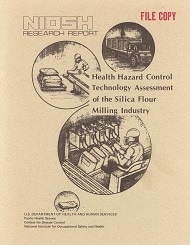Health Hazard Control Technology Assessment of the Silica Flour Milling Industry
October 1984
DHHS (NIOSH) Publication Number 84-110

Control technology assessment was conducted in three silica flour mills (SIC-0723) to evaluate existing control technology procedures, and new and innovative control strategies. Emphasis was limited to exposure control during packing, handling, and shipping of flour products. Atmospheric dust concentrations were measured. Ventilation and air flow pattern measurements were evaluated. Standard ventilation and housekeeping procedures kept the silica dust concentrations below the American Conference of Governmental Industrial Hygienists’ recommended concentration of 100 micrograms per cubic meter in most areas. Potentials for high dust exposure were seen when hand loading boxcars and trucks from conveyors or fork trucks and during intermittent packing of fine silica flour. Outside areas contributed to inhouse dust contamination. Installation of plastic strip curtains increased the effectiveness of local exhaust control systems. Plastic covers around pallet loads reduced bag breakage and dust dispersion. Automatic bag handlers reduced dust leakage. Fugitive dust emissions were reduced by transfer of materials as a wet slurry instead of dry on conveyor belts. The authors recommend immediate cleaning of product spills, proper bag handling techniques, vacuum cleaning of clothing, preventive maintenance, and environmental and medical monitoring programs. An effective respirator protection program is needed.
Health Hazard Control Technology Assessment of the Silica Flour Milling Industry [PDF – 6 MB]
